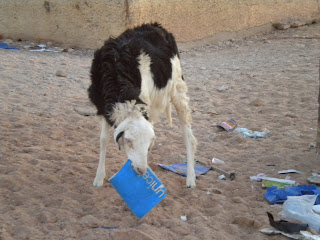
A few months ago, I nervously crammed graphs, definitions and theories before my long-feared IB exams in economics. Among the things I studied were some of the basic concepts of development, including positive and negative aspects of “aid” and other humanitarian initiatives. Last Saturday, these theoretical learnings were shown to me in practice as we went for a walk a French man, Jean Francois Debargue, who has lived in the camps for more than two years, working with desert gardening. According to Jeans's experience some of the projects that other countries establish in the refugee camps - although with good intentions – often lead to the wrong results.
The vast majority of humanitarian initiatives in the camps involves the Saharawis receiving something. Wheat comes from the European Union, hermetical oil is shipped in from the United States and sugar comes in large packs from Spain. The women distribute these foods to each part of the camp (so-called “dairas”) and then equally between the families by a person in each “barrio” (the divisions of a “daira”). This aid is absolutely essential for survival in the camps and sadly, the amount of food per person has not increased significantly over the last 30 years. Hence, there is a lot of malnutrition and the children here often look far younger than they really are.
Arguably, aid has also created a culture of dependency. A crucial part of Jean's project has therefore been to offer a meaningful activity and at the same time teach some skills of vegetable production that can be applied once the Saharawis return to their homeland. However, this process hasn't always been easy, paradoxically much due to the willingness of other organisations to “help out” in his initiatives.
Jean gave the telling example of some visitors from Spain that came down to see the gardens, liked the idea and decided to “facilitate” the project by sending down a hoard of Spanish workers for a few weeks to complete the construction. With good intentions and funding from the Spanish state the project was completed in a much shorter time than people in the camps would have managed to build the gardens themselves. However, whilst the gardens were ready to grow potatoes, carrots and other vegetables, the Saharawis that were meant to build them in the first place now lacked a sense of ownership and responsibility to initiate the planting. Consequently, the gardens were still in need of external supervision in order to carry out the planting.
Jean also told the contrasting example of an old man who made a garden entirely by himself. For years to come there will probably be vegetables planted here as the old man has a sense of responsibility and ownership of his garden. He put a lot of time and effort into building robust stone fences, making pumps for water and planting the seeds. Naturally, he won't let this hard labour go with nothing.
Naturally, this is just one example of aid gone wrong and there are many projects here in the camps that have been very beneficial to the community (such as the two schools where we teach). However, according to Jean, perhaps the biggest problem of them all is that while all these initiatives probably come with good intentions, it is also a way for other countries to hide behind a “humanitarian mask” to avoid the real political issue of Saharawi independence. Countries such as the United States, France and Spain have the last decade almost solely answered the political problem of Western Sahara with humanitarian means. The French government, for example, funds Jean's project with significant amounts, but has at the same time silently supported the Moroccan occupation with abstentions on important United Nations resolutions about the referendum in Western Sahara. So is it “aid”? Or is it a way to avoid the real political issues?








